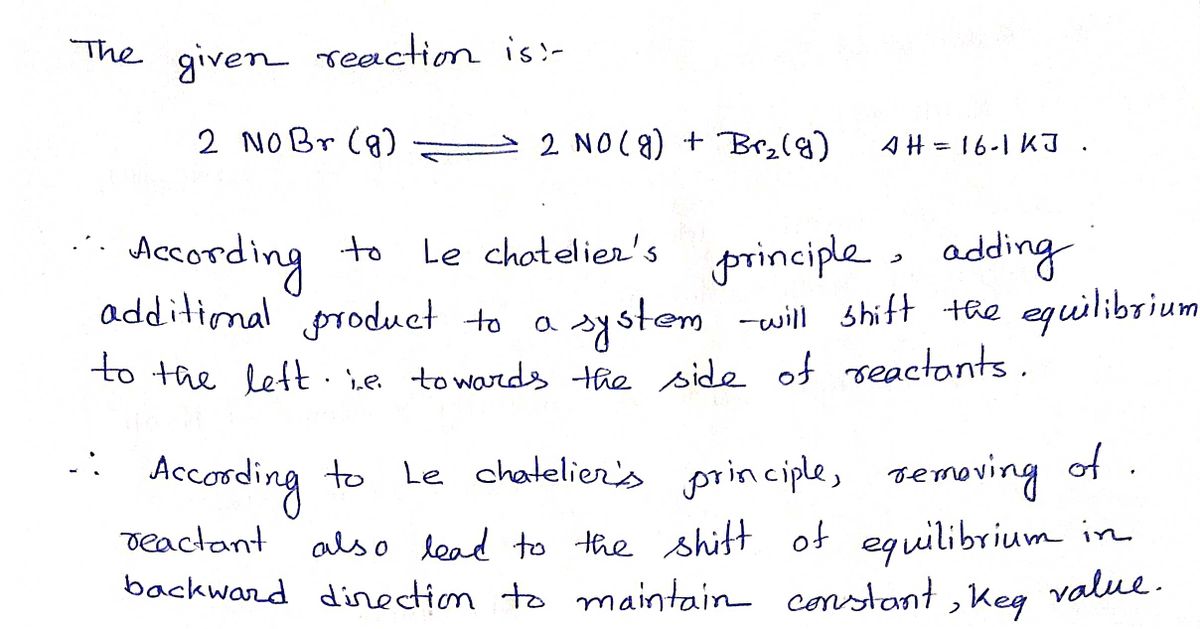2 NOBr(g) 2 NO(g) + Br,(g) AH = 16.1 kJ How does the equilibrium shift after the following stresses? a) Adding more Br, Which way does it proceed? A) Forward B) Reverse C) Neither D) Can't say b) Remove some NOBr Which way does it proceed? A) Forward B) Reverse C) Neither D) Can't say c) Decrease the temperature Which way does it proceed? A) Forward B) Reverse C) Neither D) Can't say What is much different about this third process compared to the first two?
2 NOBr(g) 2 NO(g) + Br,(g) AH = 16.1 kJ How does the equilibrium shift after the following stresses? a) Adding more Br, Which way does it proceed? A) Forward B) Reverse C) Neither D) Can't say b) Remove some NOBr Which way does it proceed? A) Forward B) Reverse C) Neither D) Can't say c) Decrease the temperature Which way does it proceed? A) Forward B) Reverse C) Neither D) Can't say What is much different about this third process compared to the first two?
Chemistry
10th Edition
ISBN:9781305957404
Author:Steven S. Zumdahl, Susan A. Zumdahl, Donald J. DeCoste
Publisher:Steven S. Zumdahl, Susan A. Zumdahl, Donald J. DeCoste
Chapter1: Chemical Foundations
Section: Chapter Questions
Problem 1RQ: Define and explain the differences between the following terms. a. law and theory b. theory and...
Related questions
Question

Transcribed Image Text:2 NOBr(g)
2 NO(g) + Br,(g) AH = 16.1 kJ
How does the equilibrium shift after the following stresses?
a) Adding more Br,
Which way does it proceed?
A) Forward B) Reverse
C) Neither D) Can't say
b) Remove some NOBr
Which way does it proceed?
A) Forward B) Reverse C) Neither D) Can't say
c) Decrease the temperature Which way does it proceed?
A) Forward B) Reverse C) Neither
D) Can't say
What is much different about this third process compared to the first two?
Expert Solution
Step 1

Step by step
Solved in 3 steps with 3 images

Knowledge Booster
Learn more about
Need a deep-dive on the concept behind this application? Look no further. Learn more about this topic, chemistry and related others by exploring similar questions and additional content below.Recommended textbooks for you

Chemistry
Chemistry
ISBN:
9781305957404
Author:
Steven S. Zumdahl, Susan A. Zumdahl, Donald J. DeCoste
Publisher:
Cengage Learning

Chemistry
Chemistry
ISBN:
9781259911156
Author:
Raymond Chang Dr., Jason Overby Professor
Publisher:
McGraw-Hill Education

Principles of Instrumental Analysis
Chemistry
ISBN:
9781305577213
Author:
Douglas A. Skoog, F. James Holler, Stanley R. Crouch
Publisher:
Cengage Learning

Chemistry
Chemistry
ISBN:
9781305957404
Author:
Steven S. Zumdahl, Susan A. Zumdahl, Donald J. DeCoste
Publisher:
Cengage Learning

Chemistry
Chemistry
ISBN:
9781259911156
Author:
Raymond Chang Dr., Jason Overby Professor
Publisher:
McGraw-Hill Education

Principles of Instrumental Analysis
Chemistry
ISBN:
9781305577213
Author:
Douglas A. Skoog, F. James Holler, Stanley R. Crouch
Publisher:
Cengage Learning

Organic Chemistry
Chemistry
ISBN:
9780078021558
Author:
Janice Gorzynski Smith Dr.
Publisher:
McGraw-Hill Education

Chemistry: Principles and Reactions
Chemistry
ISBN:
9781305079373
Author:
William L. Masterton, Cecile N. Hurley
Publisher:
Cengage Learning

Elementary Principles of Chemical Processes, Bind…
Chemistry
ISBN:
9781118431221
Author:
Richard M. Felder, Ronald W. Rousseau, Lisa G. Bullard
Publisher:
WILEY